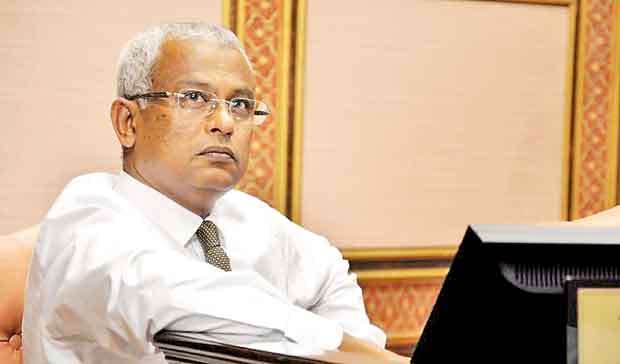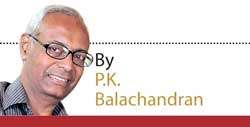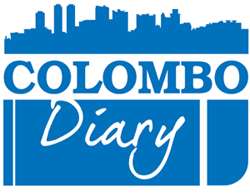03 Jul 2018 - {{hitsCtrl.values.hits}}

 The opposition parties in the Maldives are rallying round Ibrahim Mohamed Solih alias “Ibu,” who was elected last Saturday as the candidate of the Maldivian Democratic Party (MDP) for the September 23 Presidential election.
The opposition parties in the Maldives are rallying round Ibrahim Mohamed Solih alias “Ibu,” who was elected last Saturday as the candidate of the Maldivian Democratic Party (MDP) for the September 23 Presidential election.
With the opposition pledging unreserved support to Solih, the landmark Presidential election, being held after a period of great national and international turmoil, will not be a one horse race with incumbent President Abdulla Yameen smoothly sailing into his second term.
The opposition, which had formed the “Reform Alliance” to defeat Yameen in the election and also to carry out much needed reforms to accord with the letter and spirit of the 2008 democratic Constitution, has also agreed to accept a running mate put up by the Jumhoory Party (JP).
 The running mate is the Vice Presidential candidate and he or she has to be formally nominated by every person standing for the post of President.
The running mate is the Vice Presidential candidate and he or she has to be formally nominated by every person standing for the post of President.
The JP is yet to select a running mate though the front runner for the place is JP Supremo’s wife Aishath Nahula.
In his speech at the MDP Convention, Presidential candidate Solih pledged to ensure justice, repair relations with neighbours (presumably India), and to free the security forces from political influences.
As a lawmaker for 25 years, Solih said he had worked daily with people who held opposing views. Solih, who is now MDP parliamentary group leader, was first elected to Parliament to represent Lhaviyani atoll in 1994. “Opposition parties must compromise and work together for change, as the country needs a moment of peace,” he said. He urged MDP to invite coalition partners to propose changes to the MDP manifesto without compromising its essence.
One of the key elements of the MDP manifesto is to first form a coalition government of all opposition parties for a period of 18 months and then hold a fresh Presidential election in which the various parties will contest separately.
During the 18 months of coalition rule, the government will carry out democratic reforms. It will dismantle the authoritarian structures and practices characteristic of the Yameen regime. One of the key reforms will be to remove the ban on fighting elections slapped on former President Mohamed Nasheed and Jumhoory Party leader Gasim Ibrahim. They would be able to contest in the second Presidential election to be held 18 months after the first one in September 2018.
Solih pledged to be “a man of the people,” and added: “I assure you that I will not be a slave to anyone.” Currently leader of the MDP in Parliament, Solih has been in politics for 25 years. He got into Parliament first, way back in 1994. He has not been charged with any crime and put in jail for long, unlike so many others in his party and other opposition parties.
He was arrested in March during a protest against the declaration of a State of Emergency on February 5, but was released after nine days. However, he continued the agitation against Yameen by leading the boycott of Parliament, which has been effective till date.
Unlike self-exiled MDP Supremo and former President Mohamed Nasheed, Solih is not a controversial or abrasive figure. He gets along with others and liked by all, including the leaders of the ruling Progressive Party of Maldives (PPM).
PPM leaders have always considered Solih a better candidate than Nasheed because it will be easy to work with him if he rather than Nasheed, is in charge of the MDP and the opposition.
This is the reason why the Fisheries Minister and PPM leader in charge of negotiating with the opposition parties, Dr. Mohamed Shainee, said Solih’s nomination augurs well for resuming all-party talks on ironing out issues between the Yameen government and the opposition.
“Solih’s nomination is a step towards reconciliation,” Shainee said on Sunday, as he went on to appeal to the joint opposition candidate to help resume the stalled all-party talks to resolve outstanding issues and ensure a free and fair election.
The all-party talks had been stalled because the government and the opposition could not find any middle ground. The government said convicted and jailed opposition leaders could not be released arbitrarily but the opposition parties had made unconditional release a precondition for talks. Not all in the ruling PPM believe that the ghost of Nasheed has been laid. PPM Deputy Leader Abdul Raheem Abdulla told the media on Sunday that Solih’s sole job as President would be to pave the way for Nasheed’s return as President after 18 months.
The MDP’s manifesto, to be ratified by other opposition parties, says that a coalition government will be formed after the September 23 elections, and 18 months later, a fresh Presidential election will be held in which parties can contest independently. With the ban on jailed leaders having been removed by the coalition government, Nasheed and others, who are now barred from contesting, will be able to contest.
Nasheed’s candidature and withdrawal
The importance of the MDP congress was underscored after a decision by self-exiled former President Mohamed Nasheed to withdraw from the Presidential race. Though hugely popular, Nasheed’s candidacy had been in serious doubt because of his conviction for 13 years on counts relating to terrorism. However, regardless of the official ban, Nasheed had contested and won the party primary to secure the MDP Presidential ticket. Not unexpectedly, the nomination was rejected by the Elections Commission.
His bid to stand threatened to end efforts to bring about opposition unity which many thought was absolutely necessary to defeat an entrenched President like Abdulla Yameen. To complicate matters, Gasim Ibrahim of the Jumhoory Party also threw in his hat in the ring and even announced his future Cabinet.
It was when all hope of putting up a joint opposition was lost that someone or some forces prevailed upon Nasheed to back out.
Prospects
The joint opposition comprising the MDP, the JP, the Islamist Adhaalath Party and former President Maumoon Abdul Gayoom now have a 50:50 chance of defeating President Yameen.
The MDP and the rest of the opposition rate their chances as being very high, but the PPM has predicted a 52% votes for itself.
The contest will essentially be between Yameen’s development oriented but authoritarian policies and the opposition’s plea for the restoration of democracy.
It will be between the value of participating in the existing Constitutional institutions like Parliament and boycotting them to make them unworkable and their decisions seem to be illegitimate.
It will be a choice between engaging opponents and opting out of engagements in favour of confrontation from set positions. It will be a choice between sticking to the rules and laws enacted by Parliament and seeking extra-parliamentary and extra-constitutional solutions. Lastly, it will be a contest between settling matters within the country and getting foreign help both political and military, to do so.
28 Oct 2024 1 hours ago
28 Oct 2024 2 hours ago
28 Oct 2024 3 hours ago
28 Oct 2024 4 hours ago
28 Oct 2024 7 hours ago